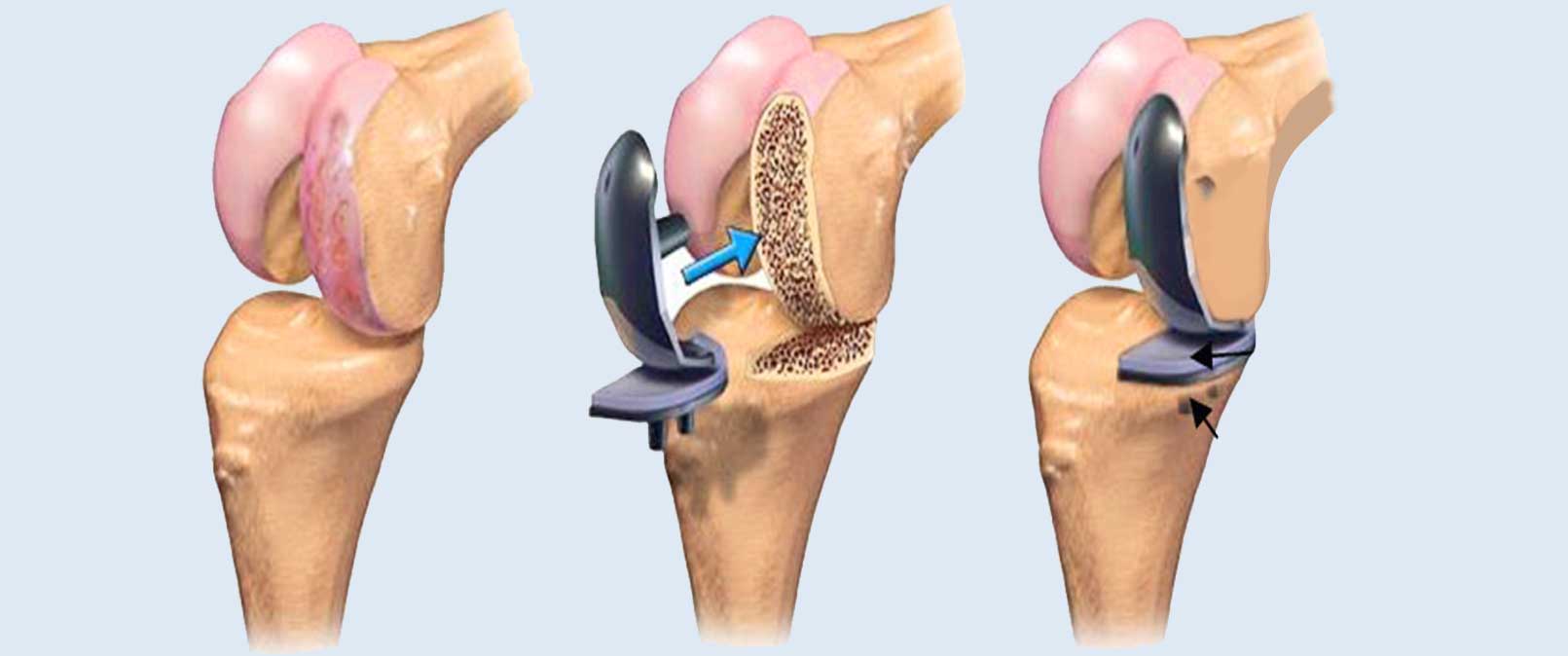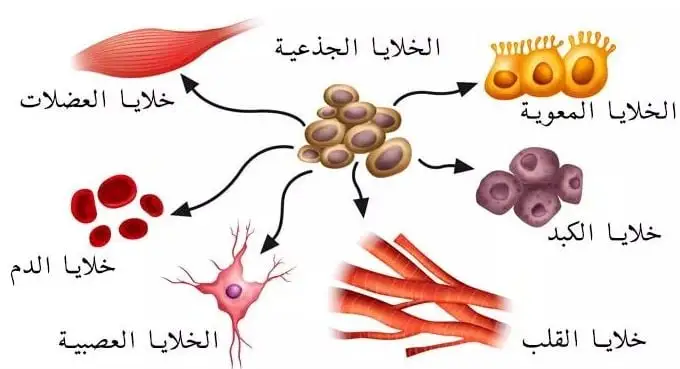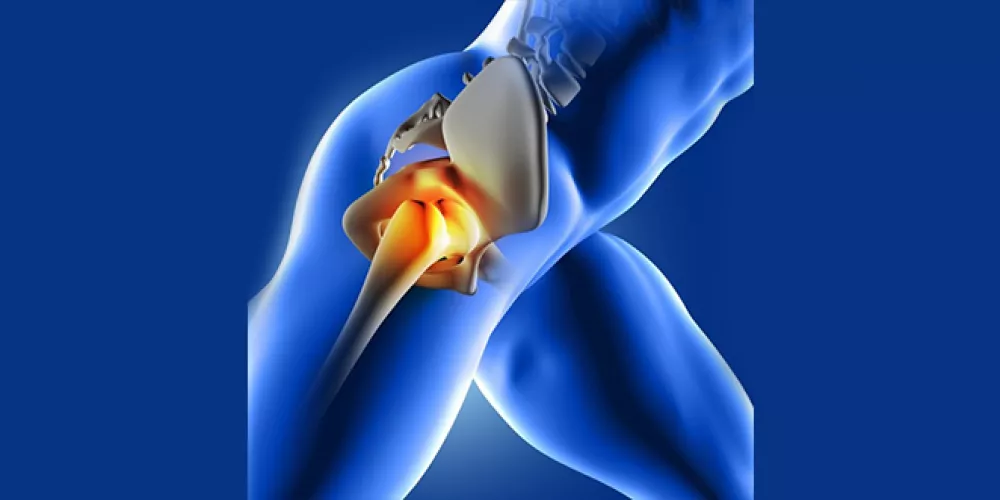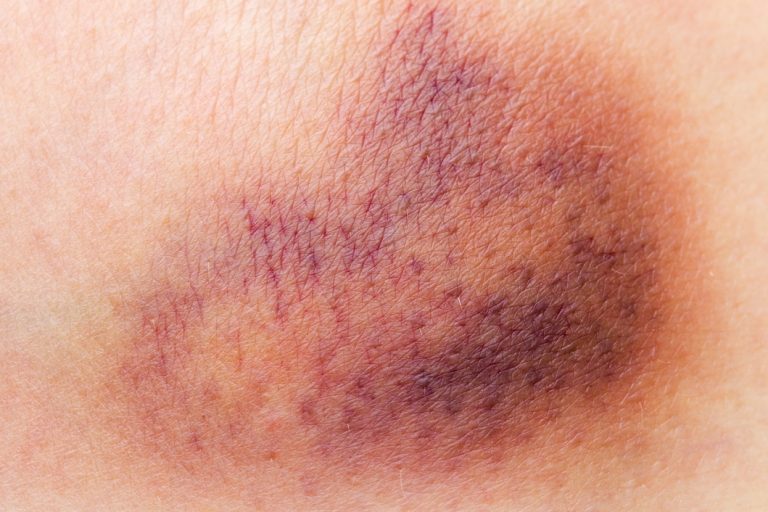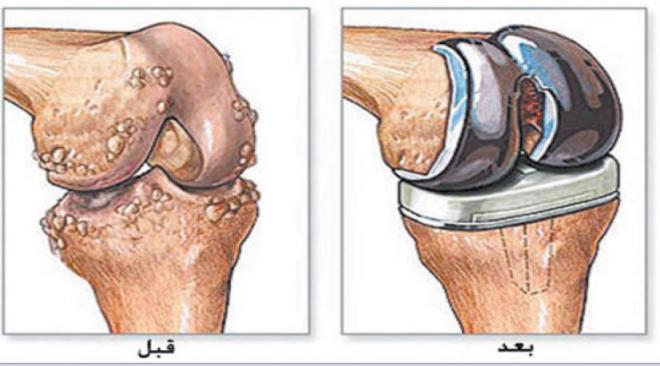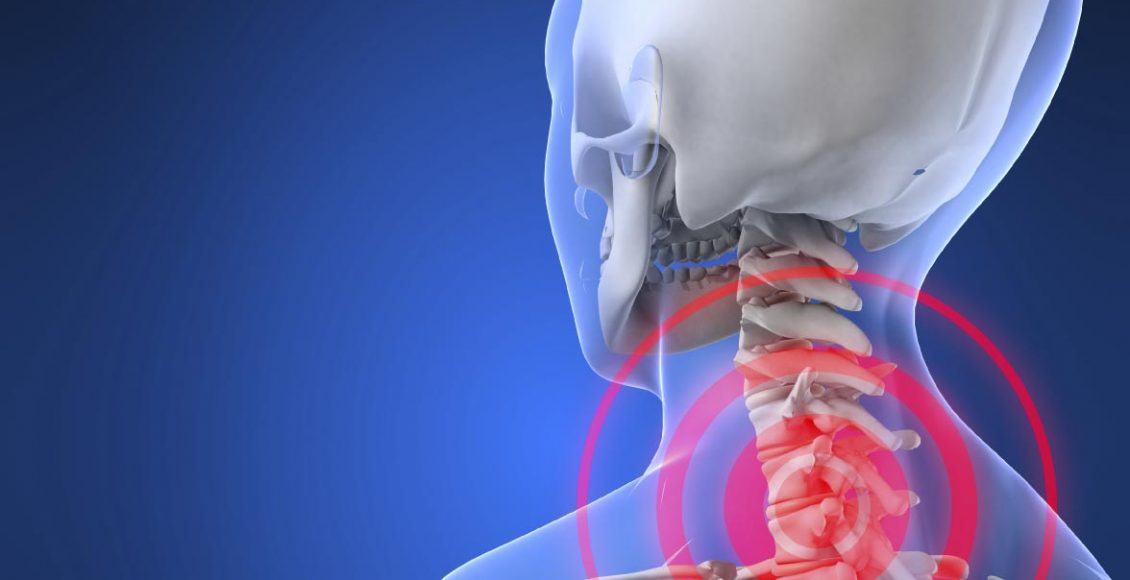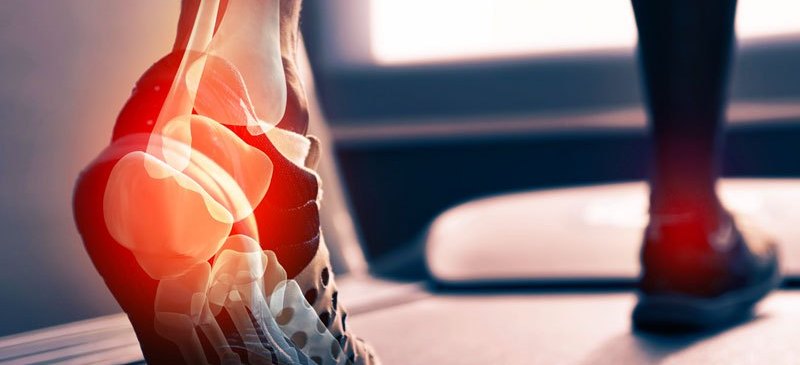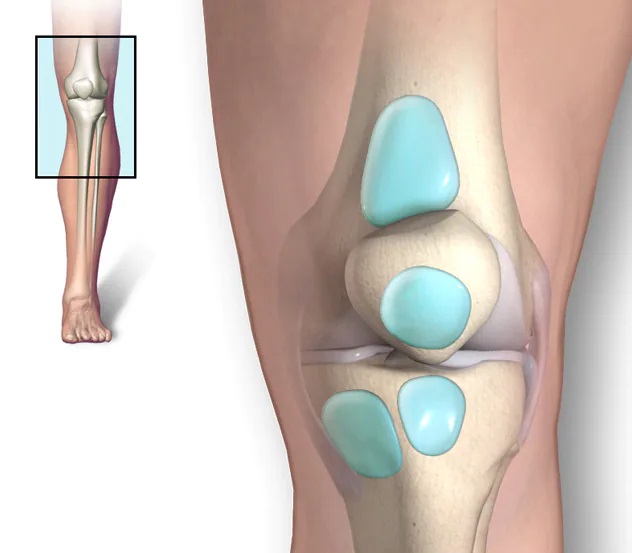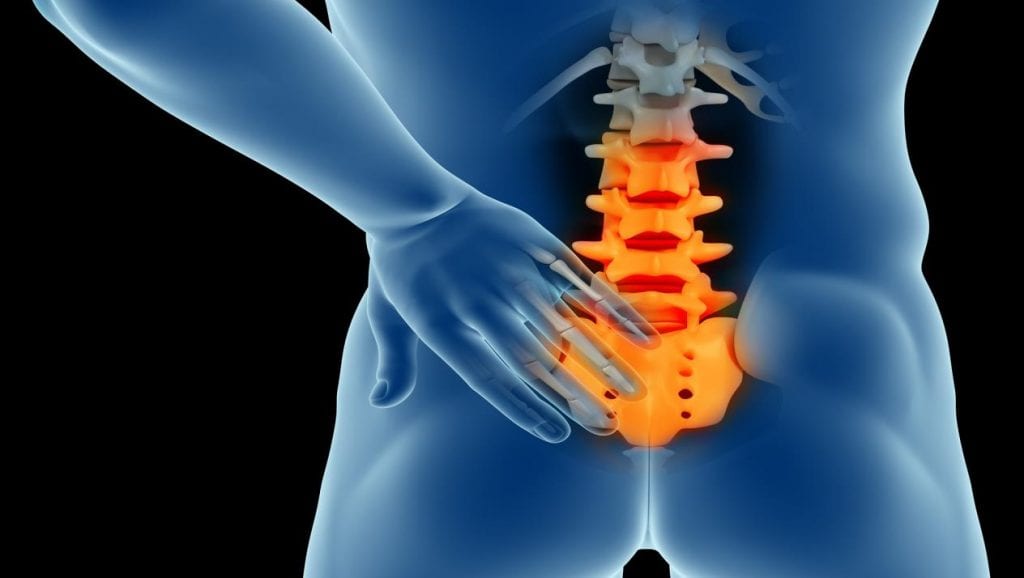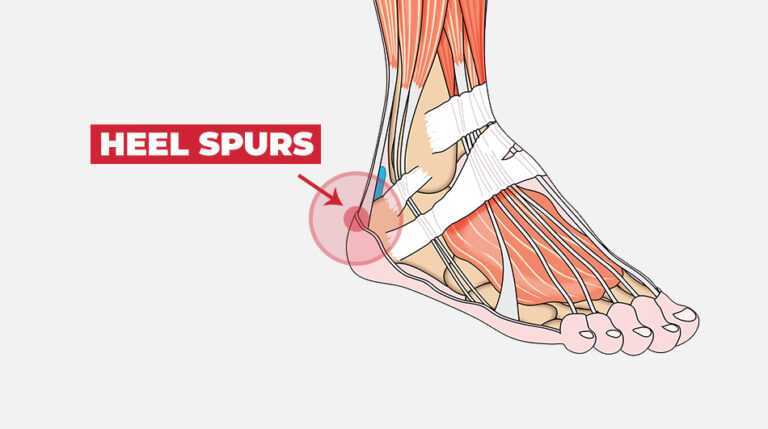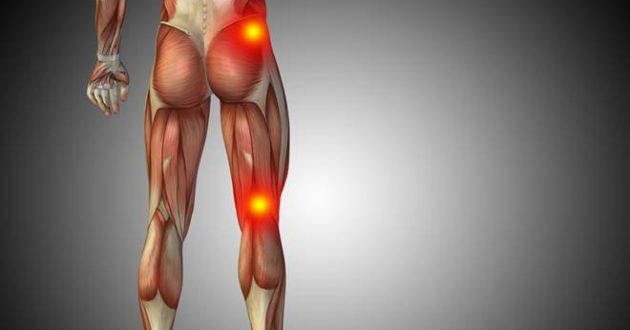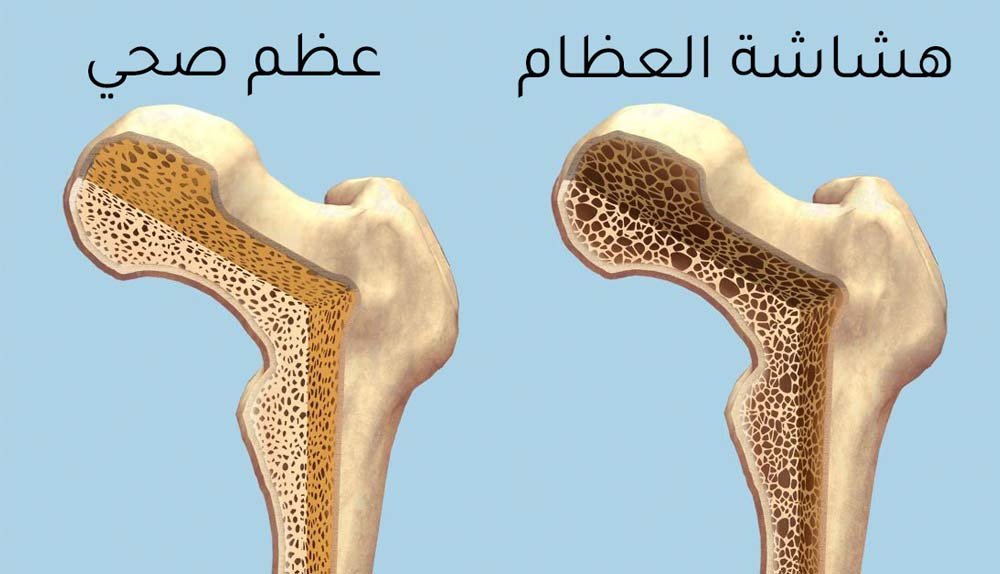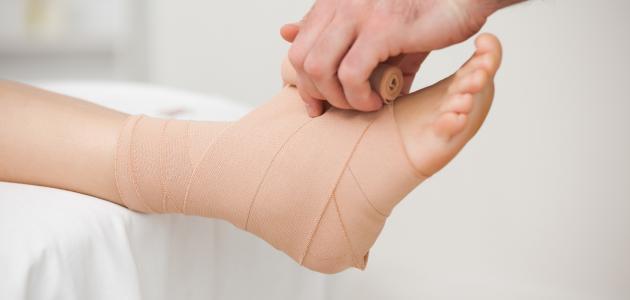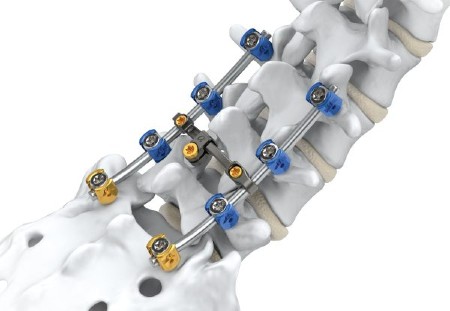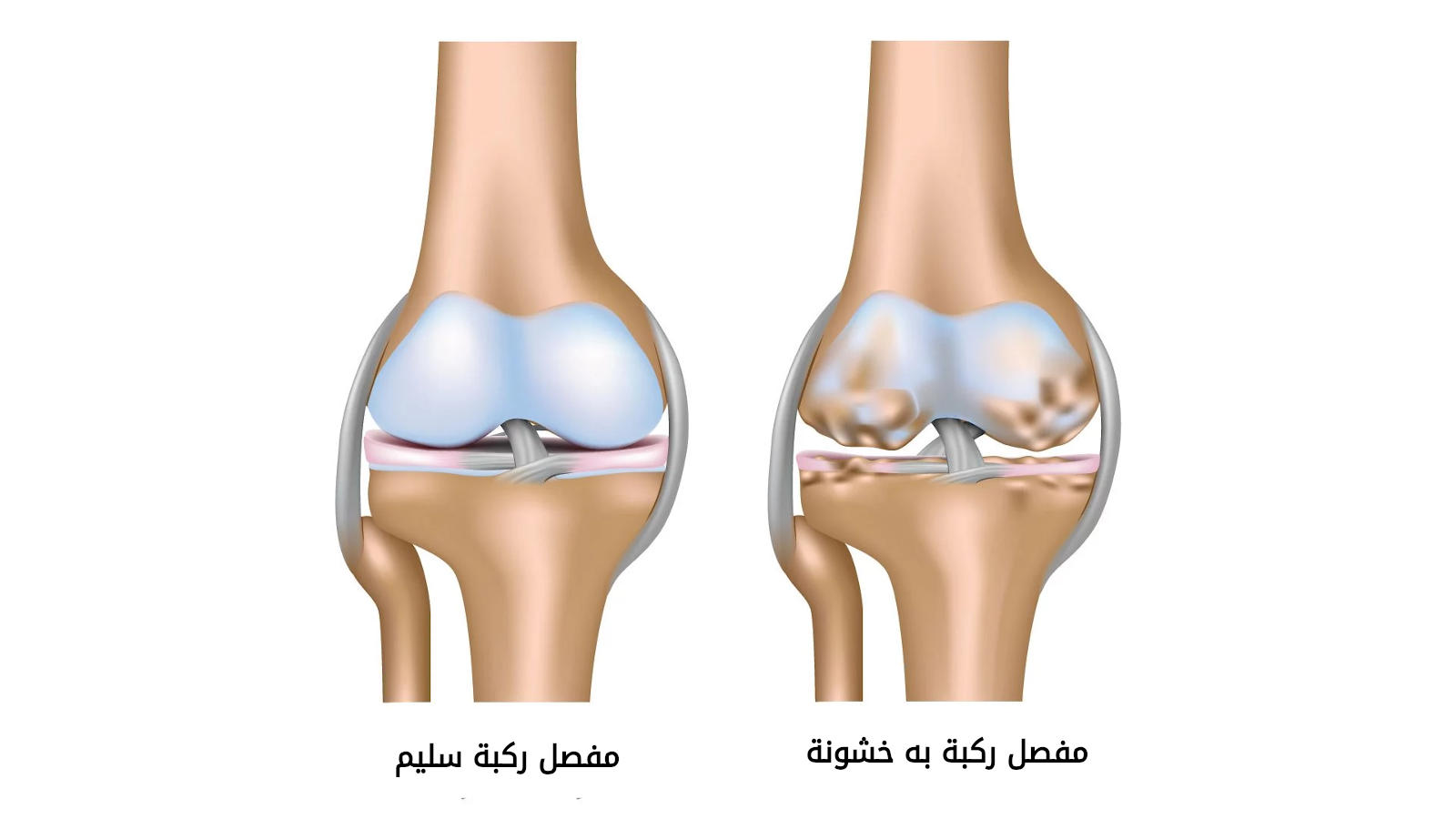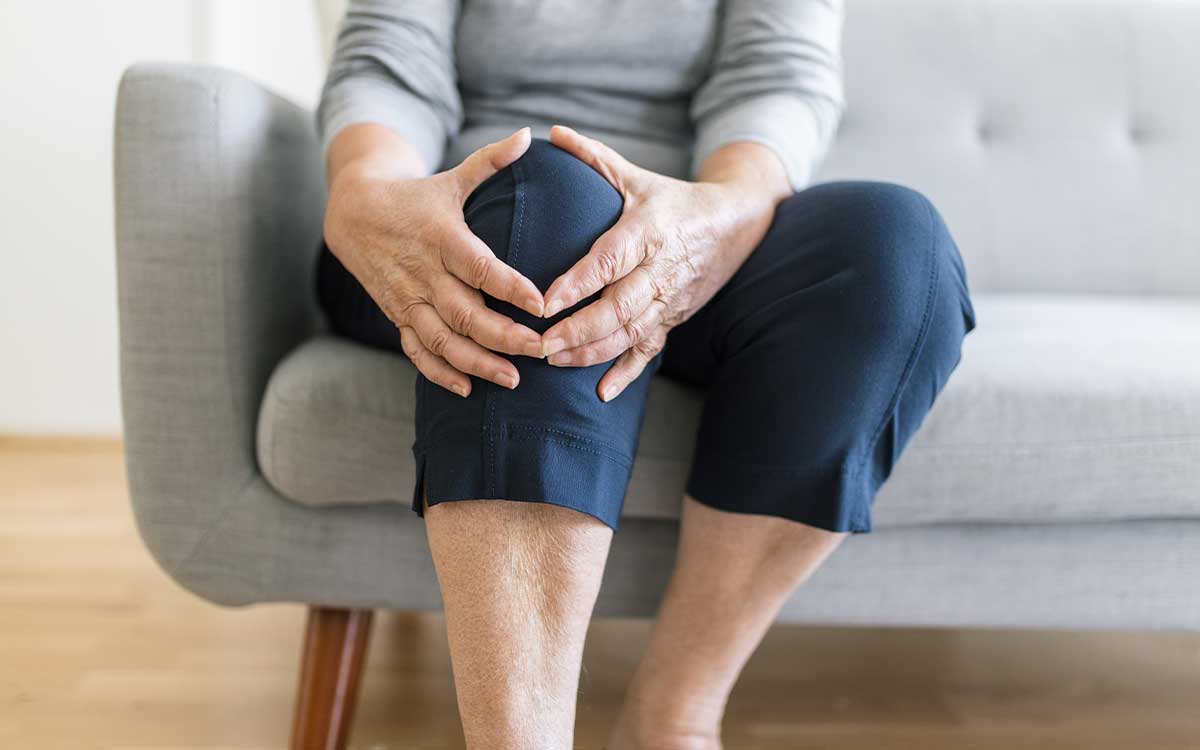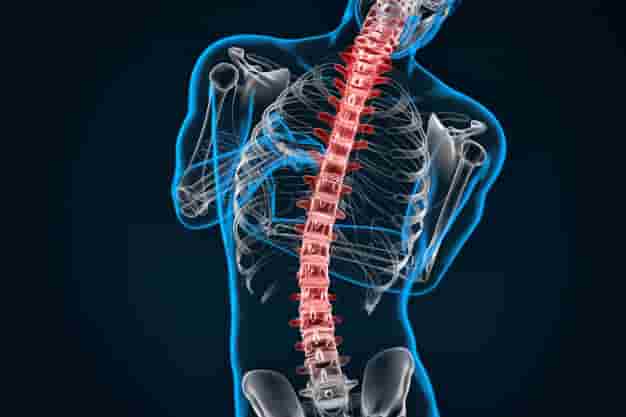?Causes and treatment of gout, what are the most prominent symptoms that confirm the patient’s suffering from it
Causes and treatment of gout, in this article, we will explore in detail the causes of gout and the risk factors associated with this health condition and shed light on the distinctive symptoms of gout and how it can be diagnosed, and then we will review the most important options and treatments available to relieve pain and prevent future attacks in addition, we will highlight advice and lifestyle changes that can help prevent recurrence of this painful condition and improve overall quality of life, so let’s start together to explore the causes and treatment of gout in depth.
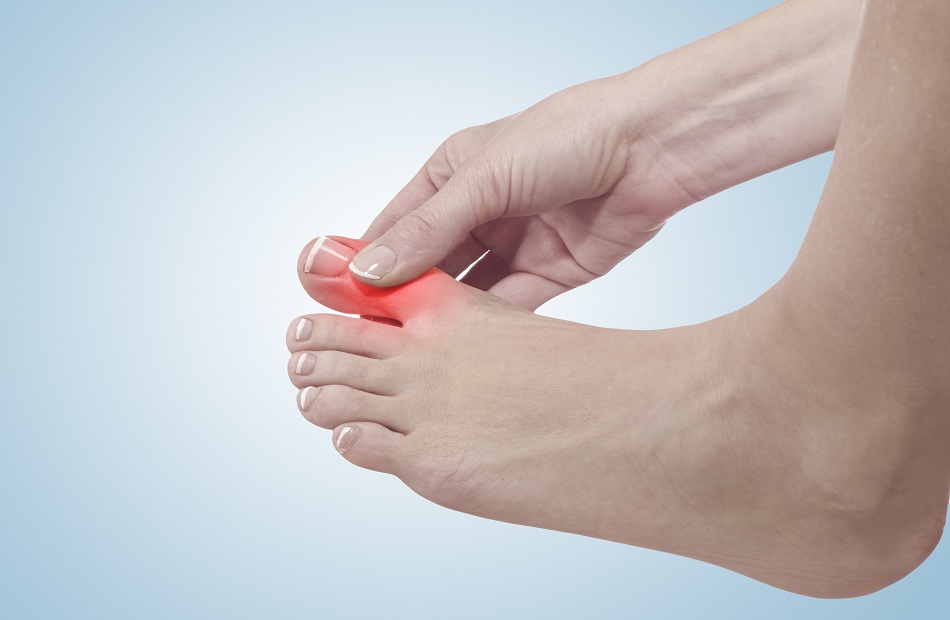
Causes and treatment of gout
Gout is a painful medical condition accompanied by joint inflammation, which occurs as a result of elevated levels of uric acid in the blood, leading to crystallization of uric acid in the joints and surrounding tissues. Men are more likely to have gout than women, and the chances of it occurring increase greatly with age. Here is a list of the main causes and treatments of gout:
- Increased production of uric acid: Uric acid is produced by the breakdown of peptides and proteins in the body. Elevated uric acid levels can be caused by prolonged breakdown periods or increased production.
- Impaired excretion of uric acid: Uric acid is usually excreted by the kidneys. If there are any problems with kidney function, this may lead to the accumulation of uric acid in the blood.
- Weakened kidney excretion capacity for this acid: In some cases, the excretion of uric acid by the kidneys may become inadequate to properly dispose of it.
I am aware that there are many treatment options and lifestyle changes that can be made to deal with gout. Nevertheless, patients should consult a doctor before taking any therapeutic action and follow the recommended medical advice for the best results.
Consult Dr. Amr Amal for an accurate assessment of your condition and the treatment options available for gout.
Where does gout disease come from?
Gout is a chronic health condition accompanied by joint inflammation. It is estimated that about 1-2 percent of adults worldwide suffer from it. Gout occurs when the concentration of uric acid in the blood increases and crystals form from this acid in the joints, leading to inflammation, swelling and severe pain in the affected joints. To better understand the source of this disease, we must become familiar with the process of uric acid formation in the body. Uric acid is usually formed from the breakdown of a substance called purine, which is found in some foods and arises from the breakdown of emotive cells in the body. Purine is converted to uric acid by an enzyme called xanthine oxidase.
There are many reasons that may increase the likelihood of developing gout. Genetic factors play an important role in increasing the chances of contracting the disease, as you may have a hereditary disorder in the kidneys that affects the ways uric acid is disposed of from the body. Specifically, in families with a history of gout, the probability of infection increases. Consuming foods high in purine can also increase the risk of developing gout disease. Purine is a substance found in many foods such as beef, citrus fruits, smoked fish, leafy greens, and fructose-sweetened carbonated beverages. When large amounts of these foods are consumed, the likelihood of uric acid accumulation in the blood increases.
We understand the pain and disruption of gout and provide comprehensive medical support to patients with Dr. Amr Amal.

Symptoms of gout
Gout is a chronic health condition that causes uric acid crystal deposits in various tissues in the body. This disease can affect the joints and cause severe and annoying symptoms. In this article, we will shed light on the symptoms of gout disease and how to deal with them.
- Sudden and severe pain in the joint: One of the main signs of gout disease is the sudden feeling of sharp pain in the joint. The pain usually starts in the big toe, but can also occur in the ankles, knees, elbows, and even other fingers.
- Redness and swelling in the joints: In addition to pain, affected joints may also become swollen and red. These signs indicate inflammation and irritation in the affected joint as a result of uric acid crystal deposits.
- Difficulty moving: Gout can affect a person’s ability to move freely due to pain and swelling in the joints. Difficulty walking and bending affected limbs may occur. This can lead to reduced ability to perform normal daily activities.
- Fever and infections: Gout disease may be accompanied by a rise in body temperature due to inflammation in the affected joints. Local skin infections may also occur in the affected area.
- Kidney stone formation: Gout can cause kidney stones, which are solid accumulations of uric acid in the kidneys. These stones can lead to back or abdominal pain and difficulty urinating.
- Blood vessel blockage: The accumulation of uric acid crystals in tissues can lead to blockage of blood vessels. This can cause redness, swelling and pain in the affected area. In severe cases, it can lead to permanent tissue damage.
- Frequent attacks: Most gout sufferers experience recurrent symptom attacks. These attacks can last for short periods of time (days to weeks) before symptoms temporarily disappear.
- Consult your doctor:
If you are experiencing symptoms similar to those of gout disease, it is important to consult a doctor for the proper diagnosis and necessary treatment. The doctor may order laboratory tests to measure uric acid levels in the body and assess the condition of affected joints.
Get distinguished care and treatment customized for gout with the best quality standards with Dr. Amr Amal.
How is gout diagnosed
Gout cases are joint diseases that require accurate and rapid diagnosis by specialist doctors. Gout patients suffer from an accumulation of uric acid in the body, which leads to the formation of crystalline aggregates in the joints, causing pain, swelling, inflammation. In this comprehensive medical guide, we will take a deep look at how gout is diagnosed, including symptoms and tests used.
Symptoms:
- Acute pain in the affected joint: People with gout suffer from severe pain in the affected joints, usually in the big toe, and the pain is usually sudden and localized to one area.
- Swelling and redness: Pain can be accompanied by swelling and redness in the affected joint.
- Difficulty moving: Patients find it difficult to move or use the affected joint.
Exams used:
- Blood tests: Blood tests are used to measure uric acid levels in the body, and high levels of uric acid indicate accumulation in the patient’s body and support the diagnosis.
- Urine analysis: Urine is analyzed to measure the level of uric acid in it and ensure its proper withdrawal from the body.
- Synovial fluid: A sample of the fluid in the inflamed joint is taken and examined under a microscope. The presence of uric acid-like crystals provides strong confirmation of the diagnosis.
Clinical diagnosis:
In addition to laboratory tests, the doctor evaluates the patient’s symptoms and medical history, and the doctor checks for other infections that may be causing symptoms similar to gout. The clinical steps include examining the affected joints and observing the accompanying symptoms.
Learn how to reduce the recurrence of gout attacks and minimize complications with Dr. Amr Amel.
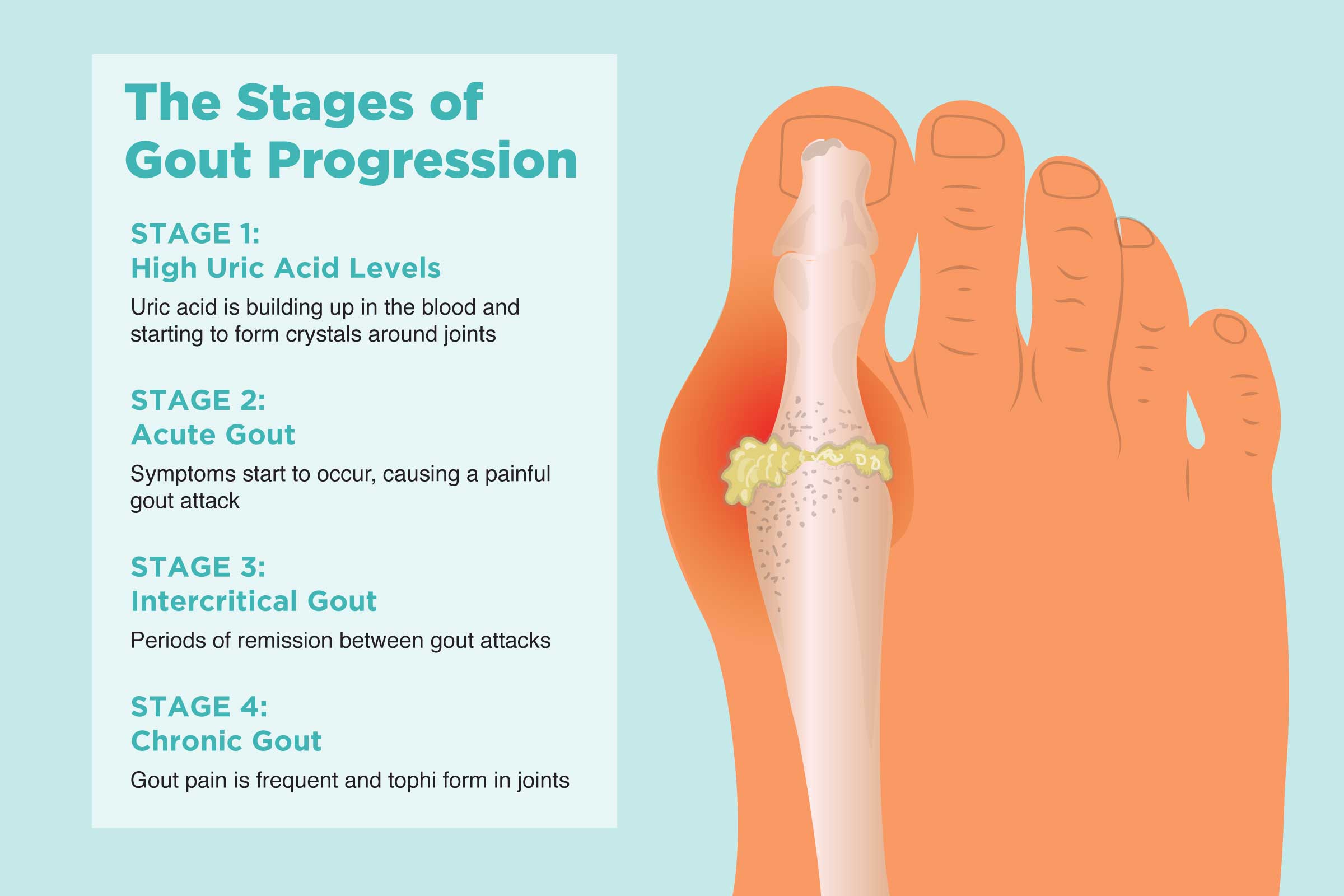
Tips for living with gout
If you suffer from gout, it is important to follow some important tips to live with this disease and reduce its painful attacks. Here in this article we provide you with useful medical advice to live with gout:
- Adherence to medical treatment: Patients are advised to follow the doctor’s instructions and take prescribed medications regularly. Anti-inflammatory drugs and uric acid reducers can help reduce gout attacks.
- Avoid foods high in purines: You should avoid eating foods that contain high levels of purines, such as red meats, fatty fish, animal organs, some vegetables and fruits like chocolate, beer.
- Pay attention to nutrition: It is advisable to follow a healthy and balanced diet, containing adequate amounts of vegetables, fruits, whole grains and fiber. It is preferable to reduce consumption of saturated fats, salt and sugars.
- Drink plenty of water: You must take adequate amounts of water to dilute uric acid accumulation in the body and help relieve gout symptoms.
- Exercise: It is important to exercise regularly, such as walking or swimming. Regular physical activity helps improve organ function and lose excess weight, which reduces gout attacks.
- Avoid alcohol: You should completely avoid alcohol or minimize its consumption to a minimum, as alcohol increases blood uric acid levels and increases the risk of gout attacks.
- Maintain a healthy weight: It is advisable to maintain a healthy weight and avoid obesity, as excess weight increases the risk of gout attacks.
- Be sure to consult a doctor: The condition should be followed up with the doctor regularly and undergo the required tests to assess the status of gout and adjust treatment.
Using these medical tips and following a healthy lifestyle, people suffering from gout can live with this condition and reduce its annoying attacks. However, it should be noted that in case of severe symptoms or worsening condition, the doctor should be consulted immediately to assess the case and guide the necessary treatment.
We are here to help you regain your daily life and get rid of pain and swelling with Dr. Amr Amel.
How to prevent gout?
It is important to learn how to prevent gout and reduce the risk of its occurrence. Gout is a health condition caused by high levels of uric acid in the blood. Here are some guidelines that can be followed:
- Follow a healthy diet: It is advisable to eat foods rich in fiber, fruits and vegetables. Red meats and foods high in purines such as animal organs, vocal cords, blood and canned foods should be avoided.
- Drink enough water: Drinking enough water is essential to keep the body hydrated and cleanse the urinary system.
- Avoid alcohol: Alcohol consumption can increase the likelihood of gout and lead to increased concentration of uric acid in the blood.
- Exercise regularly: Maintaining regular physical activity can help prevent gout. Exercise can help lower blood uric acid levels and promote overall health.
- Avoid obesity: Excess weight is a contributing factor in increasing the likelihood of gout. It is important to follow a healthy diet routine and achieve a healthy weight to reduce the risk of gout.
- Stop smoking: Smoking is a factor that increases the likelihood of gout. Therefore, it is important not to smoke to maintain health and prevent gout.
It should be noted that gout prevention is not a definitive medical recommendation, and a doctor should be consulted for proper diagnosis and appropriate treatment. Patients suffering from gout should follow the advice given by the doctor for their overall health improvement.
Dr. Amr Amel always strives to provide the best medical solutions for gout patients with modern and effective methods.
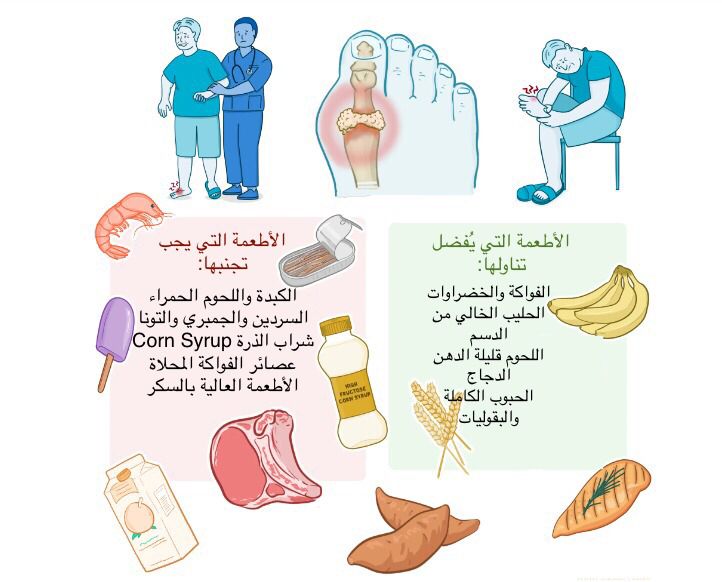
Gout complications
5 serious gout complications: What you need to know
- Formation of gout nodules: The formation of gout nodules is considered one of the common complications of gout. These nodules consist of uric acid crystals accumulating in the tissues and joints. These nodules can cause acute inflammation and severe pain in the affected joints.
- Arthritis: Arthritis is one of the common gout complications. When uric acid accumulates in the joints, it can cause acute inflammation of the affected joints, accompanied by severe pain, swelling and redness of the joints.
- Tophi formation: Tophi formation is a serious complication of gout. Tophi are solid, painless tumors that appear on the skin and around the affected joints due to the deposition of uric acid crystals. The accumulation of tophi can lead to joint destruction and reduced mobility.
- Kidney disease: High uric acid levels in the body can lead to the formation of uric acid stones in the kidneys. These stones can cause obstruction of the urinary tract, causing severe pain and difficulty urinating. If the problem progresses, it can damage the kidneys and lead to serious health problems.
- Skin inflammation: Gout can cause swelling and inflammation of tissues adjacent to affected joints. This inflammation may appear as swelling, redness and heat of the skin. Skin inflammation can progress to other health problems if gout is not diagnosed and treated on time.
Medical studies recommend prevention of gout complications by maintaining healthy uric acid levels in the blood. It is advisable to avoid foods high in purines such as red meat, fatty seafood, and foods high in sugars. It is also recommended to drink adequate amounts of water and exercise regularly. If symptoms of gout or any of its complications appear, a doctor should be consulted immediately for proper diagnosis and treatment.
Benefit from Dr. Amr Amal’s advanced medical techniques and innovative gout treatments.
Treat gout permanently
Treating gout permanently requires following a proper diet and reducing uric acid accumulation in the body. There are several steps that can be taken to alleviate symptoms of gout and prevent recurrent attacks. First, it is best to consult a specialist to determine the appropriate treatment and dosage for those with gout. The drug Colchicine is commonly used to treat acute gout attacks, as it helps relieve pain, joint inflammation. The dose ranges from one to 4 tablets per day, and the dose may be adjusted according to doctor’s recommendations.
In addition to drug therapy, patients are advised to change their dietary lifestyle. This requires avoiding foods high in purines such as red meat, offal and oily seafood. Instead, it is better to eat foods low in purines such as vegetables, fruits and whole grains. Regarding fluid intake, drinking adequate amounts of water helps accelerate uric acid removal from the body and reduces the risk of gout attacks. It is best to completely avoid alcohol or minimize intake to a bare minimum as alcohol is a trigger that increases uric acid accumulation in the body.

What is Pseudogout?
Pseudogout is a health condition that resembles some of the symptoms and mental expressions of real gout, but is not associated with high levels of uric acid in the blood. People with pseudogout suffer from severe joint pain, swelling, redness, as well as difficulty moving those affected joints. This condition is attributed to the presence of calcium pyrophosphate under the skin that causes an inflammatory response that causes the symptoms of pseudogout. Additionally, patients may experience mental symptoms such as depression and anxiety associated with this condition. Although the exact causes of pseudogout are unknown, anti-inflammatory and pain relief treatments can be used to soothe symptoms. It is important to consult a specialist for an accurate diagnosis and appropriate treatment plan.
Causes of gout in women
Gout is considered one of the health conditions that women suffer from less than men, as the female sex is characterized by lower rates of uric acid in the body compared to men. Despite this, some women suffer from gout and are at risk of this health problem. In this exclusive article, we will discuss the most important causes of gout in women and associated risk factors, including:
- Metabolic disorders: Gout occurs as a result of disorders in purine metabolism, where uric acid accumulates in the blood either due to increased production of uric acid or decreased excretion by the kidneys.
- Diet: Dietary factors play an important role in increasing the risk of gout. When large amounts of foods high in uric acid such as red meat, seafood, and legumes are consumed, the concentration of uric acid in the blood increases.
- Obesity: Obesity is an influential factor in increasing the risk of gout in women. Obesity leads to an increased burden on the cardiovascular system, which increases the likelihood of uric acid accumulation and gout development.
- Genetics: Genetic factors may play a role in increasing the risk of developing gout, as some families are more prone to develop this health problem.
- Some medications: Some women develop gout as a result of taking certain medications, such as diuretics used to treat high blood pressure and some antineoplastic drugs.
Risk factors:
- Age: The risk of gout increases in women with age.
- Weight gain: Obese women are more prone to gout.
- Metabolic disorders: Women with metabolic disorders such as diabetes and high blood pressure face a higher risk of gout.
- Diet: Eating foods high in uric acid, especially red meat and fat-containing foods, is a gout risk factor.
- Alcohol exposure: Alcohol is an influential factor in increasing the risk of gout.
Although gout is less common among women, they are still prone to this disease that causes pain and swelling in the joints. Women should follow a healthy lifestyle and avoid eating foods that cause increased uric acid. They should consult a doctor if any symptoms similar to those of gout appear, as early diagnosis and necessary treatment can help control the disease.

Who is the doctor specializing in treating gout?
Dr. Amr Amal is a doctor specializing in treating gout. Gout is a health condition that causes joint inflammation due to the accumulation of uric acid in the body. It is known that gout causes severe pain in the joints, especially the big toes. Dr. Amr Amal recommends a specific drug to treat gout. The anxiety-free treatment he recommends is an effective way to deal with gout.
In summary, Dr. Amr Amal is a doctor specializing in treating gout. He is known for providing reliable, anxiety-free treatment. For those suffering from gout problems and wishing to start the appropriate treatment before the condition worsens, Dr. Amr Amal may be the best choice.

